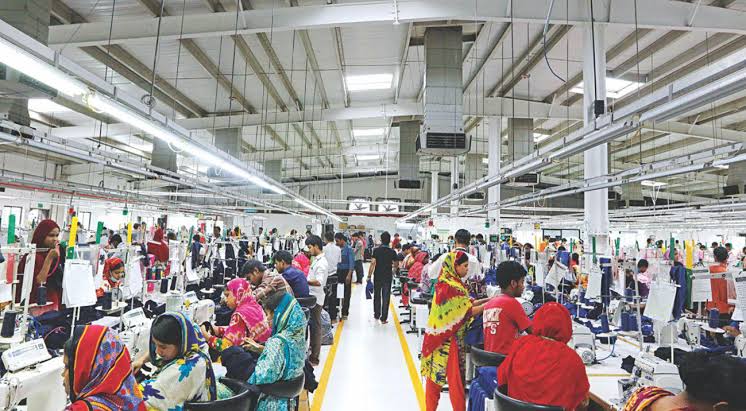Monira Munni
Published:2023-11-29 14:41:51 BdST
Apparel owners tighten regulatory noose around export industry
Apparel owners tighten the regulatory noose around the export industry, in an apparent backlash against furious wage protests, by ordering moratorium on fresh recruitment and information holdback to forestall any recurrence.
Two apparel apex bodies-BGMEA and BKMEA--have made a number of instructions to their members in this regard, including an update on workers' biometric database, keeping service books and not sharing information with any third party without their consent.
They asked member units to suspend fresh recruitment mainly in a sequel to more than two weeks of massive demonstrations by workers for wage hike, and the fixation of a raised minimum wage by government-formed wage board in the face of labour demand for doubling the amount.
Labour leaders see such measures as part of a ploy to 'blacklist' those workers who engaged in the wage-hike agitations.
Bangladesh Garment Manufacturers and Exporters Association (BGMEA) in a circular issued on November 14 asked its members to regularly update workers' biometric database trying to keep track of labour situation.
BGMEA president Faruque Hassan in the circular said, "Biometric system will play an important role in preserving workers' real statistics while help workers in getting different financial benefits, controlling jobs and irregular migration."
A day before, on November 13, in a separate notification, the trade body had further instructed preserving service books of their respective workers mainly to comply with the labour law and ensure compliance with the dos.
"It has been observed that though each of the member factories collects service books from BGMEA, they do not comply with the requirement of information, such as they do not return the books when workers leave or ask for the previous ones in time of new recruitment," reads the circular.
As a result, they are not getting desired benefits of keeping service book.
Explaining the benefits, the BGMEA also said the books are also helpful in reducing unexpected migration-from factory to factory in the once-spontaneously built industrial belts.
On November 09, the association instructed freezing fresh recruitment and hanging 'no-vacancy' notice at main factory-gate.
On an identical note, Bangladesh Knitwear Manufacturers and Exporters Association (BKMEA) on November 12 in a circular asked its members to suspend fresh recruitment amid the ongoing local political and global situations that have created pressure on the economy, especially on the manufacturing sector.
Both the trade bodies further asked members to refrain from sharing any information without their approval.
The BKMEA president, AKM Salim Osman, in the circular said the sector was having a rough ride through political instability and global wars that have deepened the economic crisis.
"Suspend fresh recruitment and make the notice visible at the gate. If new recruitment is required, verify workers' all requisite information before appointment," says the regulatory edict.
The circular also carried instructions for ensuring all personal information of workers from labour database and regularly updating the database.
Labour-rights promoter Babul Akter alleged that the trade bodies were collecting information through database and service books mainly for blacklisting workers who participated in wage protests.
Mr Akter, vice president of Industriall Bangladesh Council, a local chapter of the global rights body, said a factory re-appointed terminated workers after they had warned of informing their buyers for taking steps against the factories if they 'blacklist' any of the workers involved in the recent wage-hike movement.
According to Industrial Police three factories had terminated some 91 workers since October 23 till November 26, in an apparent reappraisal.
Since October 23, the sector had witnessed over two-week-long wage protests on demand for pay hike to Tk 23,000 through rejecting owners' proposal for Tk 10,400.
As the government finalised Tk 12,500 as the minimum apparel wage on November 12 and the prime minister asked the workers to return to work, the labour situation began to bounce back to normal.
At least four garment workers lost their lives while hundreds were injured and cases implicating thousands were filled, a hundred arrested and jailed in connection with the violence.
When asked, terming workers' database 'sensitive', Centre for Policy Dialogue (CPD) research director Dr Khondaker Golam Moazzem said the monitoring of biometric database should be done under tripartite arrangement involving factory owners, workers and government as the information could be used for various purposes or any intentional ones so that workers are not harmed.
"Maintaining neutrality is also important as it is apprehended that workers might be 'blacklisted'," he said.
Factory owners in many cases do not update the worker database on a regular basis, which might create obstacles in providing many benefits, including financial ones for illness, injury, deceased and others, he noted.
"As there were labour protests for wage hike, and with the announcement of new wage structure for the garment sector, workers have accepted it. BGMEA and BKMEA should issue another circular withdrawing the previous ones especially on suspension of fresh recruitment and information sharing," the economic policy researcher suggests.
"Otherwise workers will be deprived. Despite having employment opportunity, they (workers) will not get job," Mr Moazzem says.
Unauthorized use or reproduction of The Finance Today content for commercial purposes is strictly prohibited.


